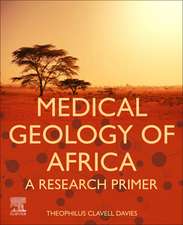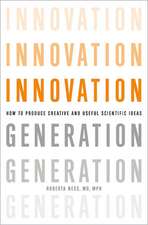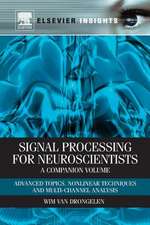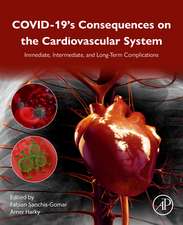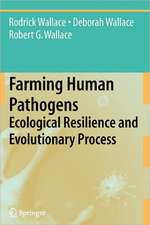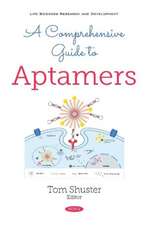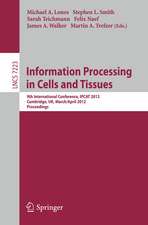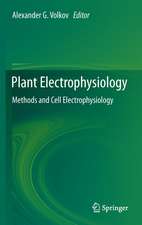Biotechnological Advances for Microbiology, Molecular Biology, and Nanotechnology: An Interdisciplinary Approach to the Life Sciences
Editat de Jyoti Ranjan Rout, Rout George Kerry, Abinash Duttaen Limba Engleză Paperback – 26 aug 2024
The volume mainly focuses on the highly demanding thrust areas of biotechnology that are microbiology, molecular biology, and nanotechnology. The book provides a detailed overview of the beneficial roles of microbes and nanotechnology-based engineered particles in biological developments. Also, it highlights the role of epigenetic machinery and redox modulators during the development of diseases. In addition, it provides research on nanotechnology-based applications in tissue engineering, stem cell, and regenerative medicines.
Overall, the book provides an extended platform for acquiring the methodological knowledge needed for today’s biotechnological applications, such as DNA methylation, redox homeostasis, CRISPR, nano-based drug delivery systems, proteomics, genomics, metagenomics, bioluminescence, bioreactors, bioremediation, biosensors, etc.
Divided into three sections, the book first highlights some recent trends in applied microbiology used in different areas, such as crop improvement, wastewater treatment, drug delivery, healthcare management, and more. The volume goes on to cover some advances in cellular and molecular mechanisms, such as CRISPR technology in biological systems, induced stem cells in disease prevention, integrated omics technology, and others. The volume also explores the indispensable role of nanotechnology in the precisely modulating intricate functioning of an organism in diagnostic and therapy along its application in tissue engineering and regenerative medicine and in food science as well as its role in ecological sustainability.
This multidisciplinary volume will be highly valuable for the researchers, scientists, biologists, and faculty and students striving to expand their horizon of knowledge in their respective fields.
| Toate formatele și edițiile | Preț | Express |
|---|---|---|
| Paperback (1) | 609.45 lei 6-8 săpt. | |
| Apple Academic Press Inc. – 26 aug 2024 | 609.45 lei 6-8 săpt. | |
| Hardback (1) | 1241.82 lei 6-8 săpt. | |
| Apple Academic Press Inc. – 6 mai 2022 | 1241.82 lei 6-8 săpt. |
Preț: 609.45 lei
Preț vechi: 717.00 lei
-15% Nou
Puncte Express: 914
Preț estimativ în valută:
116.63€ • 120.49$ • 97.07£
116.63€ • 120.49$ • 97.07£
Carte tipărită la comandă
Livrare economică 25 martie-08 aprilie
Preluare comenzi: 021 569.72.76
Specificații
ISBN-13: 9781774639474
ISBN-10: 1774639475
Pagini: 694
Ilustrații: 142
Dimensiuni: 156 x 234 x 35 mm
Greutate: 1.28 kg
Ediția:1
Editura: Apple Academic Press Inc.
Colecția Apple Academic Press
ISBN-10: 1774639475
Pagini: 694
Ilustrații: 142
Dimensiuni: 156 x 234 x 35 mm
Greutate: 1.28 kg
Ediția:1
Editura: Apple Academic Press Inc.
Colecția Apple Academic Press
Public țintă
Academic and PostgraduateNotă biografică
Jyoti Ranjan Rout, PhD, is Assistant Professor in the School of Biological Sciences, AIPH University, Bhubaneswar, Odisha, India. Before joining the AIPH, he worked as Assistant Professor and Head of the Post Graduate Department of Biotechnology at the Academy of Management and Information Technology (AMIT), Bhubaneswar, India. Dr. Rout has more than 10 years of experience in both teaching and research in the field of biochemistry and molecular biology. He is the recipient of a NESA-scientist of the year award and the Professor B.K. Nanda memorial award from the National Environmental Science Academy, India, and Orissa Botanical Society, India, respectively. Dr. Rout has published over 45 research articles in various national and international peer-reviewed journals and has contributed several book chapters in different edited book volumes with international publishers, including Springer and CRC Press. He is actively involved as an editorial board member and reviewer of many international journals. His area of research includes biochemical and molecular aspects of toxicology, protein and elemental profiling, gene expression of antioxidant enzymes, phytochemical screening and in vitro tissue and organ culture of medicinal plants. His recent area of interest is to understand the metal causing toxicity in cellular, biochemical, molecular level in plants which act as a potential bio-indicator of metal pollution to agriculture and public health. He earned his master’s degree in Biotechnology from North Orissa University and his PhD (Biotechnology) from Utkal University in the area of stress biochemistry, molecular biology, and nutritional stress tolerance in plants.
Rout George Kerry is a research scholar at Utkal University, Odisha, India. He has published about 27 articles in peer-reviewed international journals and edited books. He became acquainted with the importance of nanotechnology by one of his mentors, which triggered his interest to do scientific research in depth. Thereafter, Mr. Kerry was fully engaged to explore the infinite potentials that are possible from the crossover of biotechnology and nanotechnology. Basically, he emphasizes on the formulation of nano-based therapeutics against infectious and noninfectious ailments, the impact of probiotics in health management, and the role of nanotechnology in health as well as for the sustainable development of agriculture. Presently, he is working on an array of organic and inorganic nanoparticle-based drug delivery systems for reversal of type-II diabetes mellitus. Mr. Kerry graduated from Utkal University and went on to pursue his master’s degree in Biotechnology from Berhampur University, India.
Abinash Dutta recently joined the Institute of Life Sciences, Odisha, India, and carried out his postdoctoral research work on zebrafish development. His research work is mainly focused on the improvement of larval as well as cocoon traits (commercial traits) of the tasar silkworm, Antheraea mylitta, an important component of the Asian nonmulberry silk industry, through foliar supplementation of exogenous antioxidants. Moreover, he is also interested to find out the molecular mechanism and epigenetic regulation of redox homeostasis in silkworms in response to exogenous antioxidants. The outcome of his research work has been highly appreciated among insect biologists, and he was awarded a best paper and poster presentation award at a national and international level symposium. Recently, he has also awarded a BBA Young Investigator Award. Some of his research findings are published in reputed peer-reviewed international journals. Mr. Dutta received his master’s degree in Biotechnology from North Orissa University, Odisha, India. He has submitted his PhD thesis in Biotechnology at P.G. Department of Biotechnology, Utkal University, Odisha, India.
Rout George Kerry is a research scholar at Utkal University, Odisha, India. He has published about 27 articles in peer-reviewed international journals and edited books. He became acquainted with the importance of nanotechnology by one of his mentors, which triggered his interest to do scientific research in depth. Thereafter, Mr. Kerry was fully engaged to explore the infinite potentials that are possible from the crossover of biotechnology and nanotechnology. Basically, he emphasizes on the formulation of nano-based therapeutics against infectious and noninfectious ailments, the impact of probiotics in health management, and the role of nanotechnology in health as well as for the sustainable development of agriculture. Presently, he is working on an array of organic and inorganic nanoparticle-based drug delivery systems for reversal of type-II diabetes mellitus. Mr. Kerry graduated from Utkal University and went on to pursue his master’s degree in Biotechnology from Berhampur University, India.
Abinash Dutta recently joined the Institute of Life Sciences, Odisha, India, and carried out his postdoctoral research work on zebrafish development. His research work is mainly focused on the improvement of larval as well as cocoon traits (commercial traits) of the tasar silkworm, Antheraea mylitta, an important component of the Asian nonmulberry silk industry, through foliar supplementation of exogenous antioxidants. Moreover, he is also interested to find out the molecular mechanism and epigenetic regulation of redox homeostasis in silkworms in response to exogenous antioxidants. The outcome of his research work has been highly appreciated among insect biologists, and he was awarded a best paper and poster presentation award at a national and international level symposium. Recently, he has also awarded a BBA Young Investigator Award. Some of his research findings are published in reputed peer-reviewed international journals. Mr. Dutta received his master’s degree in Biotechnology from North Orissa University, Odisha, India. He has submitted his PhD thesis in Biotechnology at P.G. Department of Biotechnology, Utkal University, Odisha, India.
Cuprins
PART I: Trends in Applied Microbiology 1. Role of Endophytes in Crop Improvement 2. Omics Approach to Understanding Microbial Diversity 3. Role of Bioremediation in Wastewater Treatment 4. Usage of Engineered Virus-Like Particles in Drug Delivery 5. Novel Microbial Compounds as a Boon in Health Management 6. Rise of the Microbial World: An Economic Point of View 7. Biosafety Principles for Microbial Culture Technologies PART II: Advances in Cellular and Molecular Mechanisms 8. Intracellular Redox Status and Disease Development: An Overview of the Dynamics of Metabolic Orchestra 9. Oxidative Stress as a Detrimental Factor in Various Clinical Pathology 10. Implications of CRISPR Technology in Biological Systems 11. Revolutionary Approaches of Induced Stem Cells in Disease Prevention 12. Stem Cell Biology: An Overview 13. Recent Advances in Imaging and Analysis of Cellular Dynamics in Real Time 14. Integrated Omics Technology for Basic and Clinical Research 15. Current State of Malaria Diagnosis: Conventional, Rapid, and Safety Diagnostic Methods PART III: Nanotechnological Intervention in Life Sciences 16. Current Perspective of Biofunctionalized Nanomaterials in Biology and Medicine 17. Nano-System as Therapeutic Means 18. Recent Developments in Nanoparticulate-Mediated Drug Delivery in Therapeutic Approaches 19. Beneficial Utility and Perspective of Nanomaterials Toward Biosensing 20. Benefits of Nanomaterials-Based Biosensors 21. Role of Nanotechnology in Tissue Engineering and Regenerative Medicine 22. Protein-Based Nanosystems as Emerging Bioavailability Enhancers for Nutraceuticals 23. Application of Nanomaterials in Environmental Pollution Abatement and Their Impact on Ecological Sustainability: Recent Status and Future Perspective
Descriere
The book provides a detailed overview of the beneficial roles of microbes and nanotechnology-based engineered particles in biological developments.



